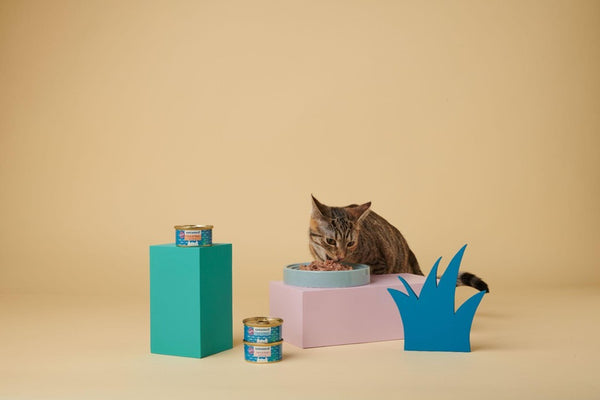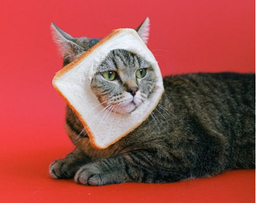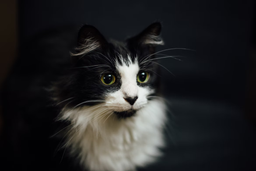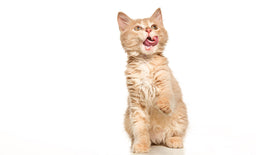Can cats drink almond milk? What to do if your cat is nuts for it
Cats are infamous for being milk fiends, but in reality, all they get from it is indigestion. This common food intolerance has prompted many cat parents to look for lactose-free products to treat their pet’s dairy addiction.
Almond milk is one of the healthiest (and yummiest) vegan alternatives to cow milk, with many beneficial nutrients, at least for humans. But can cats drink almond milk, and does it hold any biological value for them? Let’s see if the popular nut-based beverage has a place in the feline diet, or should it be on the forbidden foods list!
Can cats have almond milk?
Feeding cats almond milk, even as a treat, contributes to developing poor eating habits. The nut-based drink is:
- Low in essential nutrients—Nuts and nut-based products have an inadequate fat to protein ratio, and they don’t belong in the feline diet. Cats need more than 50% protein in their meals to remain healthy and energetic. The singular gram of plant protein in almond milk won’t provide your pet with enough vigour to catch a slug, let alone a mouse! The milk also contains three grams of fat per cup, which is more than cats require
- Filled with artificial ingredients—Store-bought almond milk can contain artificial sweeteners, preservatives, and other substances that have no place in your cat’s diet. Your pet’s meals should have natural ingredients serving a specific nutritional purpose
- Bad for their stomach—Too much almond milk will give your cat an upset tummy, especially if they suffer from chronic digestive issues (e.g. they have inflammatory bowel disease). Kittens and elderly cats are more susceptible to stomach problems, but even healthy adult cats can experience abdominal pain, flatulence, or vomiting from almond milk
- Extremely caloric—One cup of almond milk contains between 30 and 60 calories, way over the recommended allowance for most cats. If you serve it to your pet regularly, they’re at risk of becoming obese, particularly if they’re elderly or have a propensity for the condition, as some breeds do (e.g. Maine Coons and Ragdolls)

Almonds and almond byproducts are too caloric for our feline friends.
Source: Avinash Kumar
Counting calories, and why it matters
What is almond milk for cats in terms of nutrition? It’s like eating peanut butter and using a chocolate bar as a spoon—a calorie bomb with no real biological value. If you let your pet indulge in the nut-based drink, they’ll start piling on pounds quickly.
Obesity is a frequent ailment of the idle indoor cat, with some breeds more likely to develop the condition (e.g. Britain’s first domestic cat, the British Shorthair). Even without genetic predispositions, cats tend to plump up when they get older, so you need to keep them in check.
Being overweight can lower your pet’s quality of life and lead to diabetes, heart disease, and other health issues. Here’s what you can do to prevent feline obesity:
- Count calories—Cats should eat 40 calories per one kilo of their weight, which adds up to around 200 calories per day. The larger the cat, the higher the number, i.e. a fully grown Ragdoll will eat more than a Siamese cat half their size
- Don’t overfeed—How often your cat eats and in what amounts depends on the life stage (e.g. newborn kittens eat more frequently than adult cats), current weight, and reaction to sterilisation (some felines experience an increased appetite)
- Watch their weight—Keep track of their weight using a comparative weight chart. You can also check their body condition score to see if they’re rounding out
- Get them to exercise—Cats cooped up inside tend to be lethargic. Make sure your pet gets enough exercise
Can kittens drink almond milk as a milk replacement?

Can my cat drink almond milk if their mom isn’t around to feed them?
Source: Emrah AYVALI
Kittens feed on breast milk alone before they get their first incisors at around week three. If the mother is separated from the litter, a special milk replacer formula is the closest substitute. Almond milk and other plant-based products will only hurt the kitten’s sensitive stomach.
One cup of almond milk contains almost four grams of fibre (the equivalent of two wild strawberries), which is too much for developing kitties. Even a tiny sip can cause cramping, diarrhoea, and general discomfort.
A kitten milk replacer (KMR) should remain the kitty’s primary source of nutrients until they’re ready to eat solids. The formula is designed to safeguard their stomachs and help them gain weight at a healthy rate.
Once the weaning starts, you should switch to kitten-specific food with the proper ratio of protein (more than 50%), fat (up to 20%), and calcium (about 1.5%). You can also let them try chicken, turkey, fish, and other lean meat.
Make sure the meat is thoroughly cooked before serving since raw food can contain microbial pathogens. Kittens are extremely susceptible to infections and can get sick from eating undercooked meat.
Are other plant-based milk alternatives better?
Even with lactose out of the way, almond milk and cats shouldn’t mix. Let’s see if other plant-based milk substitutes are appropriate:
- Coconut milk—Coconut milk has a high percentage of saturated fats and isn’t suitable for cats. It can cause immediate gastrointestinal problems, including vomiting and diarrhoea. Coconut oil is much safer for your feline. When administered in tiny amounts, it can soothe joint pain caused by arthritis and other inflammatory processes
- Soya milk—Soya milk is even more caloric than its nutty counterpart, with 80–100 calories per cup. It also contains stachyose and raffinose, two types of complex carbohydrates felines can’t digest. If your cat drinks too much soya milk, the sugar can slowly erode their teeth, causing dental disease and tooth loss
- Rice milk—Rice milk contains 20 grams of carbohydrates per cup, way over the recommended allowance for your carnivorous pet. The starchy cereal and all its byproducts aren’t particularly nutritious for cats. Grains as a whole are primarily used to add bulk in low-quality cat food
Ultimately, felines aren’t cut out to drink milk, even if it came from a legume. Most plant-based, lactose-free products are too caloric and almost as hard to digest as dairy.
Yoghurt is the only milk byproduct that can sometimes be beneficial to felines. The natural probiotic in yoghurt can help induce bowel movement in constipated cats.
If your cat’s straining on the litter box, give them a small sip of your Activia—otherwise, keep them away from dairy and milk-like foods.

I’m not nuts! I just like how it tastes, okay? I know I'll regret it later…
Source: Pixabay
Is your cat going nuts for nut milk? Here’s what to feed them instead!
Discourage your cat from eating junk food by promoting a meat-based diet rich in moisture and protein. Cats are creatures of habit, so if they get used to a healthy meal plan, they’ll most likely move on from their nut milk phase.
Try not to hand out treats with limited nutritional value. Complementary food should provide nourishment, energy, and variety to your pet’s diet. Keep the snacks below 10% of the overall regimen, and stick to these cat-friendly foods:
|
Meat |
Veggies and fruit |
Plants and fungi |
|
Rather than giving your cat daily servings of dry food, opt for semi-moist and moist products. Dry biscuits are made via extrusion, with almost all moisture sucked out.
Kibble also contains starch and vegetable protein, which is a far cry from the feline natural diet. You can soak it in soup or mix it with wet food, but don’t make biscuits the crux of their diet.
If you ever decide to try home cooking, learn which foods are considered “junk” and which could be labelled “toxic waste.” The following items contain harmful substances that can be lethal to cats:
- Garlic, chives, and onions
- Citrus fruit
- Grapes and raisins
- Raw bread dough
- Alcohol
- Caffeine
In search of the ultimate feline diet? Get Untamed!

I think this is it, mom. Wrap it up to go, please!
Image (c) Untamed
Untamed is dedicated to producing premium, natural cat food. All our recipes are:
- High in protein—A single serving of Untamed food contains twice as much protein as the industry standard. Instead of using fillers, vegetable protein, and sugar to add bulk, we went for the real deal. Pure animal protein will keep your cat active and healthy
- Made with whole meat—The meat we use in our delicious recipes is naturally high in taurine and other amino acids. Besides being of human-grade quality, our ingredients are completely cruelty-free
- Vet-formulated—Our meals were designed with the help of veterinary experts, making sure your cat’s unique biological needs are met. Each serving is highly nutritional and free of all known allergens
- Ethically produced—We use 100% recyclable packaging for our products, remaining green in our production. Untamed is 100% Carbon Neutral Certified, and we work hard to reduce our impact on the environment
- Impossible to resist—Untamed food is fussy eater approved! If you have a diva cat who likes to pick at their food, whip up a tin of our Chocka Chicken in Jelly and watch them devour it in one go
What makes Untamed the best cat food?
We gently steam all our meals to keep the nutrients and aroma intact! As soon as you open the lid, your cat can dive right in—no defrosting or additional preparation necessary.
Besides freshness, Untamed offers personalised service. If you fill out a short online questionnaire, you can combine our delicious recipes into a unique menu.
Choose from a wide assortment of jelly and gravy delicacies made with premium meat, including:
- Chicken breast and liver
- Duck breast
- Tuna steak
- Sardine and mackerel fillet
- Salmon fillet
- Prawns
- Shrimp

Nutritious meals made with fresh, high-quality ingredients.
Image (c) Untamed
Switching to a new type of cat food isn’t an easy task. With Untamed, the transition is almost seamless, thanks to the accompanying benefits. Other members of our wild bunch have noticed the following improvements in their cat’s health within a few weeks:
|
Timeline |
Health benefits |
|
Within a week |
|
|
After two months |
|
|
Within four months |
|
|
Life-long benefits |
|
Join our wild bunch today!
With Untamed, you can buy cat food online with free shipping. Sign up for a tester pack and select a meal plan in a few simple steps:
- Visit our TRY NOW page
- Tell us about your cat (life stage, food preferences, allergies, etc.)
- Choose a meal plan and confirm your order
Your custom-made meal box will be delivered straight to your doorstep in 24 hours. Have your cat try each product and let us know which ones got the best response. If the trial pack is up to their standard, you’ll start receiving regular deliveries of Untamed food scheduled around the same date every month.
If you’d like to change, cancel, or postpone your monthly cat food subscription, feel free to contact us, and we’ll take care of it in no time!
Check out our other guides to what cats can or cannot eat:
|
|

![Best food for Ragdoll cats in the UK [Broken Down]](http://untamed.com/cdn/shop/articles/featured_best_food_for_ragdoll_cats_uk.jpg?v=1646818249&width=256)

